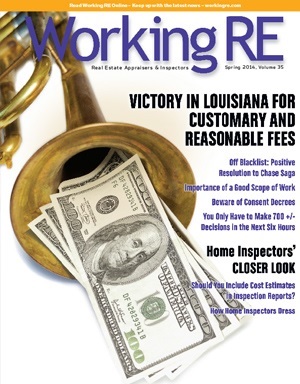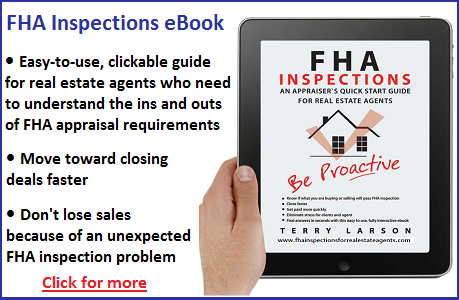 |
>> See Past News Editions >> Click to Print >> RE Agent / Broker E&O Insurance >> Am I a Working RE Subscriber? |
Smoking Gun Allows Appraiser to Sue over Blacklisting
By Isaac Peck, Associate Editor
A real estate appraiser who submits an appraisal that is under the contract price knows the potential consequences. In addition to pressure and harassment from home owners, agents and Appraisal Management Companies (AMCs), appraisers also run the risk of being branded “deal killers” and losing both lender and AMC clients; a high price for simply doing one’s job- performing accurate, unbiased appraisals.
Most appraisers have integrity and seek to maintain their independence and, as a result, have lost a client at least once, and likely many times over the course of their careers. In some cases, the AMC or lender will send the appraiser a notification that he or she has been removed from the “approved list” or placed on a “black list” for poor performance. However, as many appraisers will attest, the most common result is that they simply stop receiving work from that client. No notification is sent, just an immediate halt to the flow of appraisal work.
Very few appraisers are able to obtain solid proof that a lender or AMC is retaliating against them for not “meeting value,” but instead are left only with an uneasy feeling that the sudden drop in orders is an unspoken backlash. Without solid proof, there is not much appraisers can do but move on and try to find clients who appreciate honest work.
(story continues below)
(story continues)
A recent lawsuit filed against Yadkin Valley Bank and the AMC StreetLinks, by appraiser Michael J. McSwain, addresses precisely this issue, alleging that McSwain was retaliated against for failing to reach the targeted values needed to close loans at Yadkin. To corroborate McSwain’s allegations, the suit cites explicit internal emails from Yadkin that refer to McSwain as a “BUTCHER” and a deal killer and demand that he be removed from the approved list maintained by Streetlinks (find link to the full lawsuit below). Here’s what happened next.
Backstory
In December 2012, Michael J. McSwain, an appraiser for over 25 years, was engaged by StreetLinks to perform an appraisal on a single family home. During his on-site inspection of the property, the suit alleges that McSwain was told by the property owner that he was the second appraiser to visit the property and that the other appraiser had appraised the property two weeks prior. The owner also commented that they did not believe they could sell the property for the amount they had originally paid for it, $188,000. Shortly after his inspection of the property, McSwain submitted an appraisal to StreetLinks with an opinion of market value of $168,000.
The suit indicates that McSwain was not asked to review any additional information by either Yadkin or StreetLinks, and that no appraisal review was conducted on his appraisal. Instead of following proper review protocol, the suit alleges, Yadkin ordered a third appraisal through StreetLinks. Subsequently, the third appraiser allegedly appraised the property at $190,000 on February 1, 2013. Yadkin closed on a mortgage loan for the property of $167,500 a month later.
That same December, McSwain was engaged by StreetLinks again to perform an appraisal for another single family home. During his onsite inspection of the property, the property owner allegedly stated that he was sure the property would appraise for as much or more than the tax value of $248,000, as reported by the county tax department. However, after developing his independent opinion of the property’s market value, McSwain submitted an appraisal to StreetLinks valuing the property at $198,000.
Several weeks later, Yadkin, through StreetLinks, requested McSwain review four additional comparable sales, according to the suit. After reviewing the suggested comparables, McSwain found all four to be superior to the property in all aspects and replied that they were not comparable. The suit alleges that instead of following proper review protocol, Yadkin again failed to review the appraisal and instead ordered a second appraisal of the property through StreetLinks. The second appraisal valued the property at $250,000 and Yadkin subsequently closed a mortgage loan of $200,000 on the property.
Yadkin Blacklists McSwain
In early January 2013, according to the suit, the branch manager at Yadkin sent an email to one of the bank’s loan officers, writing: “StreetLinks has sent out a BUTCHER on two of my last refis [sic] … make sure he is not sent out in our county and make sure he is not on the approval list…I thought I would let him do these two just to see. NOW THE DEALS ARE DEAD. Michael J. McSwain. Thanks for my small request.”
According to the suit, the Yadkin loan officer then sent an email to StreetLinks requesting that McSwain be removed from the approved list of appraisers eligible to perform appraisals for the bank. Shortly thereafter, the suit alleges, Streetlinks removed McSwain from the approved list.
(story continues below)
(story continues)
Following the exchange, the loan officer subsequently emailed the branch manager stating “Done. Sorry for the issues.” After receiving the email, the suit alleges, the branch manager then forwarded the entire email chain to several other employees, writing, “FYI I have had two cut deeply by appraiser.” After receiving the email from the branch manager, according to the suit, one of the employees reportedly replied that McSwain “Is a good appraiser and I hate he is being taken off the list.”
Appraiser Independence
According to the suit, McSwain was given no notification that he was removed from Yadkin’s approved appraisal list. The suit cites North Carolina AMC regulations (12 U.S.C. 3353 {b}) that require AMCs to notify an appraiser in writing if the AMC is removing the appraiser from an approved appraisal list. Utilizing language that is taken, in part, from Dodd-Frank’s Appraisal Independence statutes, the North Carolina law states that it is prohibited for AMCs to: “influence or attempt to influence the development, reporting, result or review of a real estate appraisal through coercion, extortion, collusion, compensation, inducement, intimidation, bribery, or in any other manner, including…(8) allowing the removal of a real estate appraiser from a list of qualified appraisers used by any entity without prior written notice to the appraiser.”
The North Carolina Appraisal Board has also adopted a rule requiring that “If an appraisal management company decides to remove an independent appraiser from its list of qualified appraisers, the appraisal management company shall notify the appraiser in writing of the reason for the removal.” (21 N.C. Admin Code 57D.0311(a))
McSwain was given no notification that he was removed from either Yadkin’s or StreetLinks’ approved list of appraisers, the suit alleges.
The suit cites the Interim Final Rule, which indicates that a lender or AMC explicitly violates appraisal independence by “excluding a person that prepares a valuation from consideration for future engagement because the person reports a value for the consumer’s principal dwelling that does not meet or exceed a predetermined threshold.” (12 C.F.R. 226.42(c)(i)(D)).
Citing numerous federal and state laws, the suit argues that Yadkin and StreetLinks orchestrated McSwain’s exclusion to “facilitate inflated appraisals that would allow Yadkin Bank to extend the greatest possible volume of credit.” This under collateralized debt, the suit alleges, is then to be sold on the Secondary Market allowing Yadkin to “obtain immediate returns on insufficiently secured debt while also avoiding all credit risk. Meanwhile taxpayers, through Fannie Mae and Freddie Mac, bear the entirety of the credit risk with little chance of receiving a full recovery upon default by selling the collateral.”
Damages Sought
McSwain filed the lawsuit against Streetlinks and Yadkin in early February of this year. The case is ongoing. McSwain’s lawsuit includes five independent claims seeking compensatory and punitive damages against Yadkin Bank and Streetlinks, each one in excess of $25,000. The suit alleges that both Yadkin and Streetlinks have engaged in unfair and deceptive business practices causing damages to McSwain and that both Yadkin Bank and Streetlinks are engaged in a civil conspiracy to encourage targeted appraisals. McSwain’s lawsuit also specifically mentions Streetlinks, alleging that Streetlinks has violated North Carolina’s duty of good faith and fair dealing contract provisions by excluding him from the Approved List.
When contacted for comment, StreetLinks’ Counsel Rene Spoon responded with the following: “StreetLinks is confident that the facts of the case will support a decision in its favor. However, as this litigation is ongoing, no additional commentary will be provided at this time.”
Widespread Problem
Many appraisers have had the same experience as McSwain. After submitting an honest, unbiased appraisal to an AMC or lender (that comes back below the contract price), the appraiser will simply stop receiving work from that client. Just like McSwain, appraisers are rarely notified when they are removed from a client’s Approved List (or placed on a blacklist), and even fewer are given a clear reason why they are no longer receiving work. Richard Hagar, SRA, a national authority on lending and appraisal guidelines and frequent presenter for OREP/Working RE’s Webinar Series, advises appraisers that if they suspect foul play in such a scenario, they should press the AMC or lender for an answer. “If you’ve stopped receiving business, call the client, ask for a manager, and politely ask why. The next escalation is to send them a formal written letter. Not an email, but a formal written letter on your letterhead. Letters last longer and stay in files longer. Send it to both the AMC and the lender,” says Hagar.
Of course, there are many reasons why work might stop, and it may have nothing to do with the appraiser not meeting value. Some AMCs stop using appraisers because their work is bad, they are rude with homeowners, or take too long to respond to follow up inquiries. Nonetheless, many appraisers know from experience that McSwain’s scenario is not uncommon. “I’ve talked to Chief Appraisers at AMCs who discover that dozens of appraisers are on unofficial blacklists with no official reason given. It’s only after they begin asking around do they discover that these appraisers were quietly blacklisted because loan officers were ‘disappointed’ in the appraiser’s performance,” Hagar says.
According to Hagar, it is precisely scenarios like this that the new federal and state regulations are meant to address. “Loan officers are to have no input on approved lists. Loan production staff are to be completely separate from the appraisal process. If an AMC or lender does shop values, they are in serious trouble not only via lawsuits like this one but by their state and federal regulators including the Consumer Financial Protection Bureau (CFPB). Numerous agencies could institute a fine against the AMC and lender of $10,000 per day… for each day that the loan exists. A loss in a lawsuit could be a pittance compared to the fines the government could institute against them. This sort of issue is exactly why I try to reach out to lenders and help educate them. Education is far cheaper than losses from lawsuits,” argues Hagar.
Hagar encourages appraisers who suspect foul play to not only press the AMC and lender as to why work has tapered off but also to file complaints against the suspected parties with the CFPB, the Office of the Comptroller of the Currency (OCC), and their state regulatory boards as well. The problem, Hagar notes, is that a legitimate complaint requires proof, though in many states, the AMC removing the appraiser from the list must provide a reason why. “If the AMC is trying to say you did bad work, they should be able to provide you and your state board with the appraisal review. Not only that, they are obligated to turn you and your appraisal into your state board for disciplinary actions if they suspect USPAP violations. So the absence of either of these things should raise a red flag,” reports Hagar.
“If all else fails, find another client. You’re always going to have client turnover– it’s part of doing business. It’s important for appraisers to push back against lenders and AMCs who try to play this game with our profession, but ultimately, the goal should be to work for clients that appreciate quality work,” advises Hagar.
We’re always listening: Send your story submission/idea to the Editor: dbrauner@orep.org.



